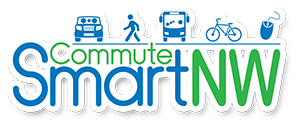How does Emergency Ride Home Work?
How does it work?
After the Commute Smart Northwest Office receives the signed ERH Agreement and deposit, they establish an account for the employer that works like a bank account. A participating employer makes a "deposit" into their account to cover anticipated rides by employees for a one-year period, minimum $200 required.
As employees use the program, "withdrawals" are made from the account to pay for the rides. Employers make additional "deposits," as necessary. Spokane County manages all employer accounts and sends statements, as needed, to the ERH Coordinator.
Who is eligible?
Any employee who rides the bus, carpools, uses STA Rideshare (formerly vanpool), bikes or walks to work on the day the emergency ride is needed is eligible for a free guaranteed ride home.
What is an emergency?
An Emergency Ride home trip may be taken by an eligible employee in the event of the following emergencies:
- Employee or family illness
- Working late unexpectedly
- Missing normal ride home (e.g. carpool driver leaves work early due to emergency)
- Other emergency situations occurring during the workday
An Emergency Ride home trip may not be taken for:
- Pre-scheduled appointments
- Business-related travel
Where can the ERH go?
The Emergency Ride home trip must begin from work and can end at home or another location (e.g. child care or park & ride lot). Emergency-related interim stops are permitted if they are pre-approved by the ERH Program Coordinator.
What are the limits?
It is up to each employer to decide if there are limits on the number and/or length of Emergency Ride home trips taken by eligible employees. State Agency employees are limited to 8 trips per year, with no more than 4 for overtime reasons, as well as a 65 mile one way maximum. Anything beyond the 65 miles is the responsibility of the employee. Driver tips are not covered.
Commute Smart Northwest's Responsibilities:
- Lyft for Business or Advanced Transportation to provide service.
- Provide materials to promote the program.
- Provide materials and training to administer the program.
- Pay either Lyft or Advanced Transportation for legitimate service and recover costs from employer in event of program abuse.
- Generate and distribute quarterly activity reports to participating employers.
- Assess an 8% fee on all trips.
Participating Employer's Responsibilities:
- Identify a ERH Program Coordinator and at least one Back-up coordinator for each affected worksite.
- Approve and arrange trip requests, using Pre-trip Checklist form.
- Promote the program to all employees at least once a year.
- Let all employees know how to contact their ERH Program Coordinator when they need a ride home.
- Deposit $200, $300, $400 or $500 into employer's ERH account. Make additional deposits, as necessary.
- Send the Pre-trip Checklist to Commute Smart NW after a trip is taken.
Scheduling a ERH trip:
Emeregency Ride Home Program by Commute Smart Northwest has been designed to be convenient and easy to use. When an employee needs a ride home, an immediate response from the ERH Program Coordinator or Back-up Coordinator is critical. Here's what happens when a call comes in:
Employee: Calls ERH Program Coordinator when they need a ride home.
Coordinator: Determines if request is appropriate and approves/disapproves the trip. Coordinator obtains trip information from employee using Pre-trip Checklist form and schedules a ride via Lyft for Business online or calls Advanced Transportation to arrange a ride. After trip is scheduled, the coordinator will confirm trip arrangements with employee.
Coordinator: Sends a copy of the Pre-Trip Checklists to Commute Smart Northwest for recordkeeping.
Promoting your ERH Program
Commute Smart Northwest will provide participating employers with marketing materials to promote their ERH Program.
- Sample emails (insert links)
- Flyer
- Posters
- ERH Pre-Trip Checklist
![]()

